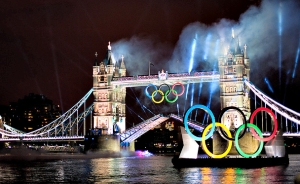British Public Diplomacy and the Olympic Games
On July 26th 2012, Her Majesty’s Ambassador to the United States appeared on Comedy Central. Sir Peter Westmacott’s interview on The Colbert Report generated more positive feedback than any other appearance since his arrival in Washington six months earlier. The hook, of course, was the imminent opening of the London 2012 Olympic and Paralympic Games. The questioning was as playful as expected: “What is the special relationship? Is that anything like confirmed bachelors?” “New York City vied for the 2012 Games. Are you here to gloat?” Sir Peter gave appropriately light-hearted answers. But he also delivered important messages about the importance of the bilateral relationship: “Whenever there’s a conflict around the world, the Brits and the Americans stand side by side…The United Kingdom is the biggest foreign investor in America. One million people in this country owe their jobs to working for British companies…One million Brits owe their jobs to working for American companies.” The Ambassador repeated this success in the more traditional milieux of NBC, MSNBC and NPR.
If public diplomacy is the achievement of policy goals by public means, this was a classic example of how to do it: tap into opportunities as they present themselves; create a buzz; but, at the same time, never forget why you stepped into the limelight in the first place. The outstanding success of the Olympics and the fantastic acclaim the Games brought to the UK are, of course, good things in themselves. But having captured the world’s attention, it was up to us to try to focus this attention on Britain’s policy priorities.
Even without the Games, 2011-12 would have been a bumper time for international interest in the UK, with a Royal Wedding, a State Visit (by President Obama to the UK), an Official Visit (by Prime Minister David Cameron to the U.S.) and the Queen’s Diamond Jubilee. In order to channel the unprecedented interest in all things British, the Department of Culture, Media and Sport devised the cross-government GREAT campaign. As the Prime Minister said at the launch in New York, GREAT is “an invitation to the world to take a fresh look at everything we have to offer.” To emphasise Britain’s extraordinary diversity, the campaign organizes our activities into themes: Countryside, Creativity, Business, Entrepreneurs, Green, Heritage, Innovation, Knowledge, Music, Shopping, Sport and Technology. Each has a dedicated Facebook page, mixing traditional content such as ministerial speeches with features designed to provoke discussion. This framework allows us to brand our efforts with a tagline for each theme (e.g. Innovation is GREAT) and thus both demonstrate the UK’s breadth and tailor messages to specific audiences. The overall objective is to burnish the UK’s well-deserved image as one of the world’s best places in which to visit, study, invest and do business.
Here in the United States, given our countrywide network of consulates, there was no shortage of local hooks to deliver our messages around the Games. In Los Angeles, for example, we highlighted the involvement of numerous LA-based companies in infrastructure development, ticketing and venues for London 2012, as well as the lessons London took from the successful legacy programme of the LA ’84 Games. Salt Lake City, another Olympic host city in my consular district, is also the capital of a state that provided ninety-nine per cent of the precious metal for the medals at London 2012, through a British-owned mine. This provided a golden opportunity—excuse the pun—to showcase the economic links between the UK and Utah, where British firms employ some 6,600 people and export goods worth $6 billion annually. Indeed, it is striking to realise that Utah leads the nation in exports to the UK. In the run-up to the Games, I penned <a data-cke-saved-href="http://www.sltrib.com/sltrib/opinion/54565931-82/games-olympic-utah-lond..." href="https://uscpublicdiplomacy.org/%3Ca%20href%3D"http://www.sltrib.com/sltrib/opinion/54565931-82/games-olympic-utah-london.html.csp">http://www.sltrib.com/sltrib/opinion/54565931-82/games-olympic-utah-lond..." title="an op-ed in the <i>Salt Lake Tribune</i>” target=“_blank”>an op-ed in the <i>Salt Lake Tribune</i></a> making these points. My colleagues around Britain’s US consulate network—particularly in another former host city, Atlanta, and in San Francisco, which is considering a future bid—<a data-cke-saved-href=" http:="" www.sfgate.com="" default="" article="" london-olympics-passes-the-baton-to-s-f-3783014.php"="" target="_blank">published pieces and gave print or broadcast interviews drawing similar local connections, while the Ambassador pulled the strands together in a high-profile piece in photocall with Prince Harry in the Embassy garden that was covered by national media in both countries. The London 2012 Paralympics, the biggest ever, will provide an even larger stage on which to emphasise the contributions and partnerships of our armed forces.
As a network, our public diplomacy efforts succeeded fundamentally because we kept two things in mind: the message and the audience. We celebrated the glitz and glamour, of course, but did not let it go to our heads. Instead, we – and, indeed, our many colleagues in posts around the world – exploited the attention garnered by the Games to get across the right aspects of Britain’s substantial offering to the most relevant people.
Tags
Add comment
Issue Contents
Most Read CPD Blogs
-
January 29
-
January 20
-
December 17
-
January 28
-
January 2
Visit CPD's Online Library
Explore CPD's vast online database featuring the latest books, articles, speeches and information on international organizations dedicated to public diplomacy.









Amazing! Its actually awesome article, I have got much clear idea about from this paragraph.